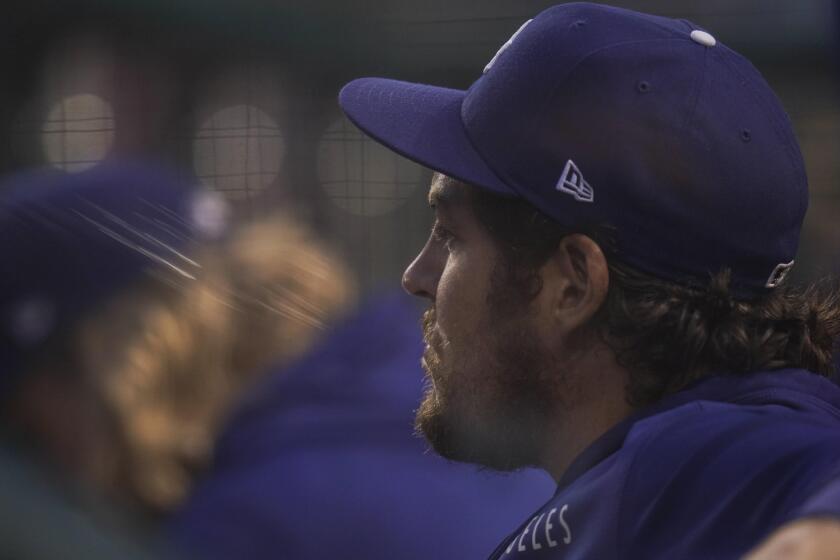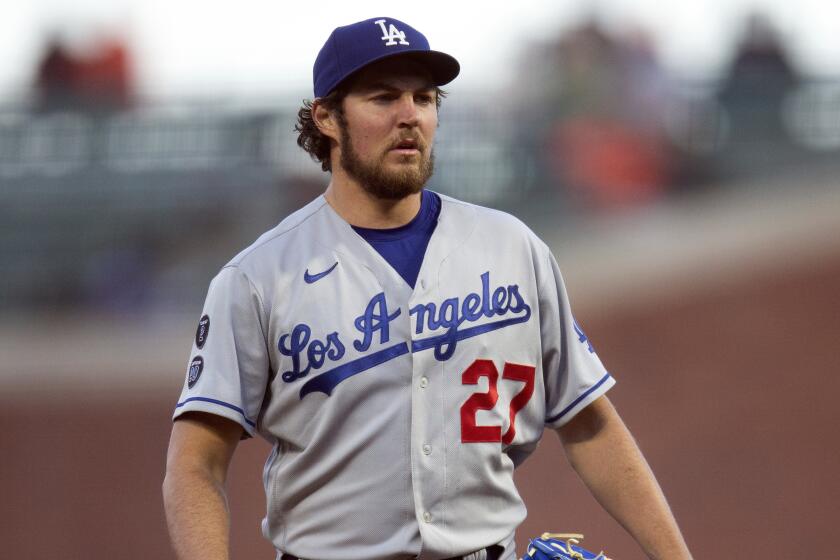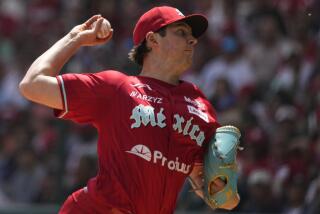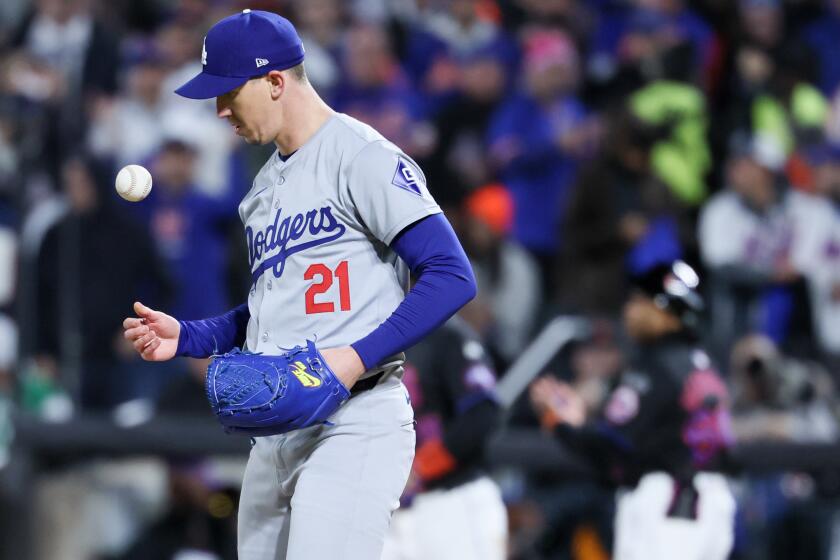Q&A: What might an MLB owner ask Trevor Bauer? Here’s a transcript of what he had to say
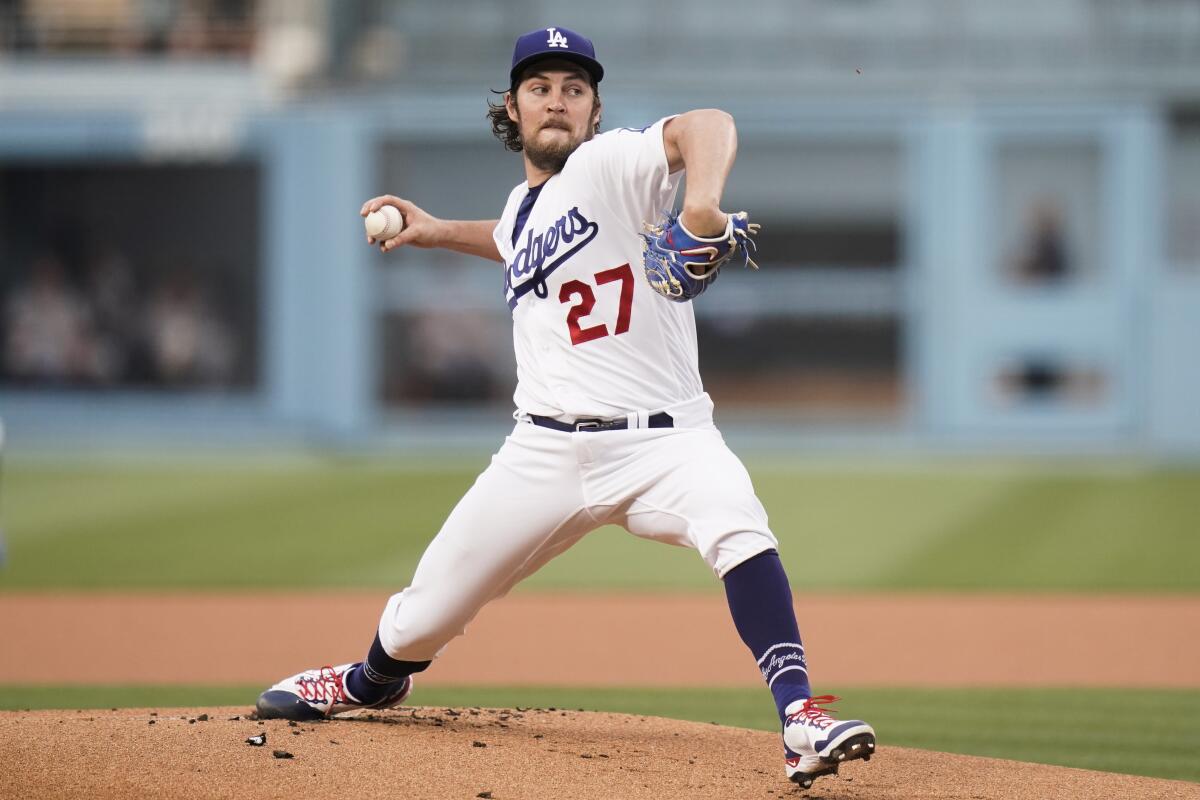
- Share via
SCOTTSDALE, Ariz. — On a Monday night three years ago, the Dodgers’ Trevor Bauer threw what might have been the last pitch of his major league career, a third strike. The next day, a woman named Lindsey Hill obtained a temporary restraining order against him, providing hospital records that said she had been diagnosed with “acute head injury” and “assault by manual strangulation” in the wake of a sexual encounter.
A court denied Hill a permanent restraining order against Bauer, and the Los Angeles County district attorney declined to file charges against him.
Major League Baseball placed him on paid leave and, after months of investigation that included allegations from other women, ultimately suspended him for violating its policy against sexual assault and domestic violence. None of the allegations resulted in charges.
His suspension expired before the 2023 season, but no major league team signed him last year, and he pitched in Japan.
He would like to return to the major leagues, but spring training is underway and no team has offered him a contract. Any team that would offer him a contract almost certainly would require him to meet with its owner.
The former Dodgers pitcher hasn’t appeared in a major league game since 2021 after MLB determined he violated its domestic violence policy. He made his case for reinstatement to a Times reporter.
What might that meeting be like? I met with Bauer to ask him things an owner might ask, posing questions as if I were an actual owner.
What follows is a transcript of that meeting edited for clarity. Bauer’s agent, Rachel Luba, participated in the interview.
As an owner, I’ll let my baseball people evaluate baseball skill. But there are close to two dozen starting pitchers still out there as free agents, and there are other guys my team could trade for. Maybe some of those pitchers are better than you. Maybe they’re not. But acquiring any of them would not divide my fan base in the way I think signing you would. So why should I sign you?
I know I can help the team. I know that I can help the other players in the clubhouse. The one thing I’m most passionate about is helping young guys develop so — outside of just my performance, which I am confident in — I know I can make my teammates better. I can make the organization better. I have ideas I could share.
Off the field, I’ve obviously made some mistakes along the way. I’d like to be an example of doing the second half of my career better than the first half of my career. I’d like to show that people can learn from mistakes, change, and get better.
I think that I have a unique ability to connect with a fan base, outside of the normal on-field stuff and team-related stuff. I have a large platform that I can connect with people on. I am passionate about helping the community and the game of baseball. I’ve probably gone about it in the wrong way. Some of the things I’ve done have been good. Some have been bad. But I’ve learned a lot over the years. I’d like to be able to connect with a fan base, help grow the game of baseball, and help grow the organization that I am with.
I get there are concerns over splitting the fan base and dividing it. I think the effect there would be a little less than people may think it can be. But I also know all the things I have to offer to a fan base, from a fan engagement perspective. Getting a second chance and showing you can learn from it and improve, I think that is a strong message that should be talked about.
I’ve read that you thought whatever controversy might surround signing you would blow over in about three days. Why do you think that?
I’m not sure if it would be three days, or five, or whatever, but it would be shorter than the vast majority of people think. I have a lot of support from players and coaches around the league. I haven’t talked about that publicly because I don’t want to make those private conversations public. I appreciate you asking Mookie [Betts] his thoughts. He obviously took some flak when he said that, so I don’t want to put others in that position, players or coaches that might not have the same standing he does.
But I know the type of support that I have around the league, from players and coaches and front offices. I don’t think there would be any problem there. I also know the support that I have from fan bases.
The majority of reads that people get on stuff are from Twitter conversations. This entire time, I’ve not had a single negative interaction with anyone in person. No one has said anything negative to me. They’ve all expressed a bunch of support. So I think the support for me getting a second chance and getting to go play is a lot larger than people can measure.
I think people can look at the situation and make their own decisions. I can see people can see one side of things: I did not do what I was accused of. I think they also see the other side of things, which is: I made some mistakes along the way. I have acknowledged those. I’m happy to talk about those with anyone, in as much detail as they want to go into. I think that’s an important piece of this — me being willing to talk through things and admit that I made mistakes and show that I am learning from those.
If we sign you, we’ll have a press conference. You’ll do interviews. You’ll interact with fans. When you say you’ll talk about your mistakes, can you be clear about what exactly you think those mistakes were? What exactly are you apologizing for, and what are you not?
I have three main categories. The biggest one is my interactions with women.
I did not do what I was accused of. But I was also pretty reckless with the people I hung out with, and the things that I agreed to do with them. That put a lot of people at risk, by opening myself up to something like this. It puts teammates and the organization at risk. It puts my family at risk. It obviously puts myself at risk.
I missed a lot of time with the Dodgers. I wasn’t there for the playoffs in multiple years. I cost them a lot of money. That wasn’t fair to my teammates and the organization.
Those are things I have stopped doing. I don’t meet people online any more. I met people online before, and that exposed me to a lot of potential bad stuff. No casual sexual relationships. I’m not sleeping around. I’m not agreeing to do the types of things in bed I did with people. I’m not having rough sex, to be specific. I don’t do that any more, even if people ask for it. That is not something I am willing to engage in.
I keep my circle a lot tighter. I don’t allow a lot of people into it. I’ve never really been out chasing women, but I don’t really meet people any more. I work, I do baseball, and that’s what makes me happy.
The second category: In my interactions with media over the years, I’ve made the situation a lot more difficult for a lot of people. I could have made things easier for the Dodgers, for the league, for my teammates.
The accusations were very serious. They should be covered. I don’t want to detract from the serious nature of what was alleged. But I think less media attention would have made things easier for everyone. I think there was extra attention on the situation because of the contentious relationships I’ve had with the media, how I’ve attacked certain people, the types of things that I’ve said, the persona I had on social media.
I can speak specifically about Ken Rosenthal. We had our vlog that got seen by hundreds of thousands of people every five days, and I started every one of them off by attacking Ken personally. At the time, I had my reasons for doing so. In retrospect, I think it was extremely immature. I should have just called him and talked to him and had a human conversation with him. That goes for plenty of other people that I have responded to, in person and also on social media.
I’ve done a lot of reflection over the past three years and tried to figure out why I responded that way. I think it was because I never really had a voice as a kid. I was bullied a lot. My life got significantly better when I started sticking up for myself, speaking up and fighting back. I let that play out too long and didn’t adjust the way I operate. So, any time someone would say something negative, I would just fight back. I told myself that I was standing up for myself. That wasn’t a mature way of thinking about it. I don’t want that to come off as an excuse for how I behaved. I just tried to figure out the reasons for what happened and why I acted a certain way so I can change. So I’ve tried to have more human conversations with people. I see that reporters are trying to do their jobs just like I am.
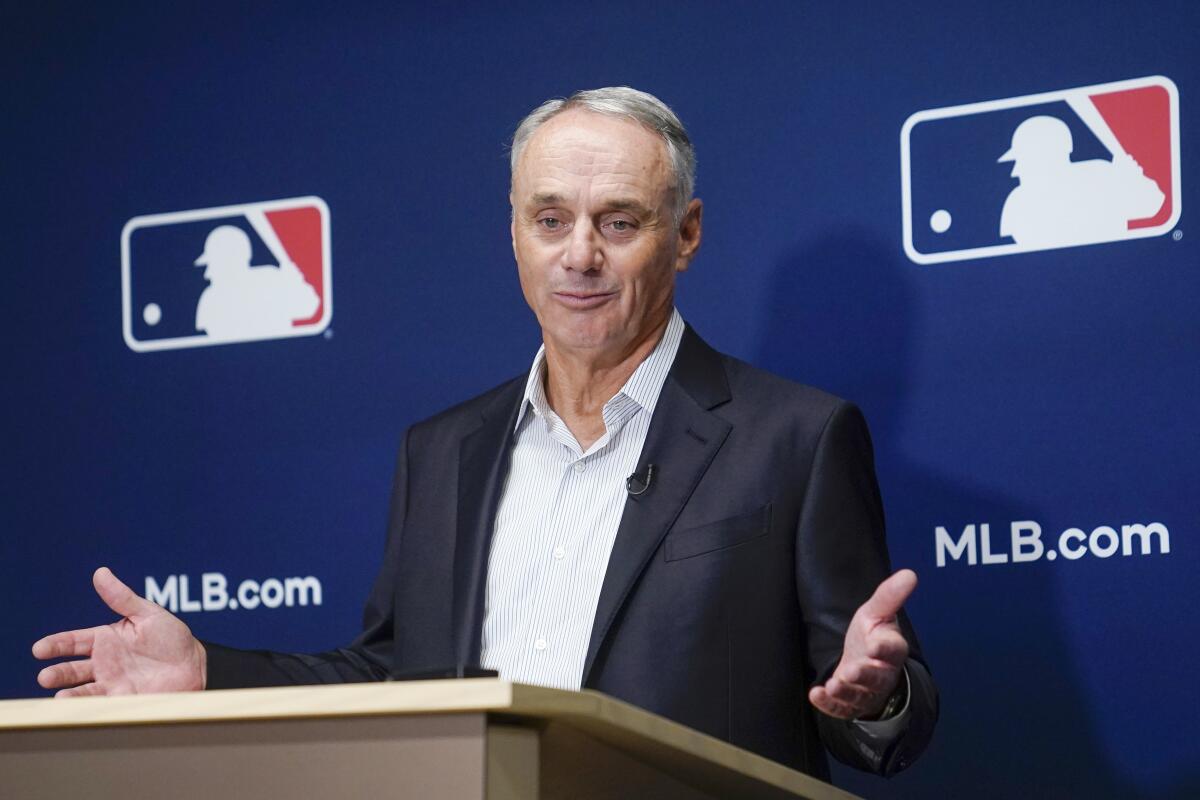
The third is: In my interactions with the league, and specifically with Rob [Manfred, the MLB commissioner], I’ve been very critical of him and his decisions, very quick to find fault without offering any potential solutions, criticizing him publicly and personally.
I started a business in 2019. I didn’t really start having employees until ‘20, ‘21. I’ve had a couple years’ experience dealing with people as a boss, and I can’t imagine what my response would be if one of my employees came out and said the types of things about me publicly that I said about Rob, especially if he had not brought them to me first.
So I’ve made mistakes there, something I don’t want to do again and I won’t do again. I’ve said things on social media that have been divisive and haven’t really considered that I’ve been a representative of a team, and that saying those things may reflect negatively upon the team. That’s not something I care to do any more. I want to be a positive for the game and the organization that I am with. I want to put out content that grows the game and interact and engage with fans in a positive way.
You’ve been clear that you want to make amends, move on, and get back into Major League Baseball. In the spring of 2022, you had a choice: accept your suspension, maybe negotiate a smaller suspension, maintain your position that you did nothing wrong, and put this all behind you and focus on returning to Major League Baseball. Instead, you sued six parties for defamation. You had a choice as to whether you wanted to keep these allegations front and center, and you did. Why did you make that choice?
There’s a lot of reasons. One, I did not do what I was accused of. As a person, I would not be OK with not standing up for myself and fighting to prove my innocence, fighting to be treated fairly. I don’t feel like I was treated fairly, in a lot of ways.
I realize that kept the allegations front and center. That may have done more harm to my career than good. I’m not sure. That was my decision. It was larger than baseball for me.
Also, there was evidence that was kept from us that has been extremely useful in showing what actually happened. Specifically, there is video that was taken by Lindsey Hill that showed exactly what she looked like when she left my place. It was not turned over to us during the original DVRO (domestic violence restraining order) hearing. Had I not sued her, I never would have had that video to prove my innocence.
I want to step in here. MLB had access to that video during their investigation. I have read that, in your arbitration hearing, that video was extensively discussed. The rulings that the judge made in the case against Lindsey Hill, before it was settled, brought front and center the idea that actually there was no judicial conclusion. His quote was: “The state court proceedings (the restraining order hearing) did not necessarily decide that Bauer did not batter or sexually assault Hill.” He said: “Notwithstanding Hill’s consent to some form of rough sex, Bauer engaged in acts while Hill was unconscious, when she was physically and legally unable to give consent.”
Luba: I am going to step in on this one and just say that, while that was a ruling that we vehemently disagree with and there is abundant case law to back that up, if you look at the ruling from the DVRO court, where that judge spoke, there was no comment about Trevor engaging in any conduct while she was unconscious, or anything like that. You can read that ruling yourself.
I’m an owner. I’m reading this judge’s opinion.
Luba: The only judge to have ever heard evidence and made a ruling on that evidence was the DVRO court. The other judge was just making a ruling based on the ruling from the DVRO but didn’t have the opportunity to actually hear evidence in a legal setting, because that wasn’t the judge’s task at that point. That was going to go before a jury.
If innocence is what you are really after, then you could have gone to trial.
To finish up what I was saying: Yes, MLB had the video. It was part of MLB’s hearing, and I can’t speak publicly about that. In order to get that out and speak publicly about that, I had to sue to get it.
But your lawyers publicly released the video a year before you did.
Luba: It was out there, from suing. It didn’t go as viral until he settled the case and included additional text messages that he did not have at the time and we only got from the lawsuit.
If this went to a trial, this would be compelling evidence on your part. I would imagine Lindsey and her lawyers would come with evidence to counter.
They have none.
That would be what a trial would be for, though.
My point on this is: That was why I chose to sue Lindsey in the first place, to get that information. That was the only way we got the video. Yes, it came out earlier than when I released it. Part of that process was, between the two times, going through discovery and all the different motions. Over the course of that time, we had depositions, we had discovery, we had text messages turned over and subpoenas served.
When I chose to settle the case, I was weighing one of two options. I had all the information I was going to get. If I settled the case, I had the ability to speak publicly about it. If I don’t settle the case, then I pay a significant amount more in legal fees to go all the way through trial, I won’t recover any money because she doesn’t have any money for me to recover, and that trial is going to happen right in the middle of spring training, which I viewed as guaranteeing that I wouldn’t have a job in MLB.
Dodgers pitcher Trevor Bauer is on paid administrative leave after being accused by a woman of sexual assault. Here’s our coverage.
Why couldn’t you speak publicly about this video before you settled?
Luba: Because he’s going through a trial. We’re trying to put on a winning case. Not that we’re concerned that what he says is a problem. But there is strategy there, and we don’t want to give away our hand. So he is advised by his lawyers to be quiet when you’re in the middle of a trial. So that’s where he was stuck.
Because of the defamation suits you filed, and because of Lindsey’s countersuit, you’ve got that judge making a ruling that you disagree with, but it’s out there. And you’ve got a judge in your suit against Deadspin saying, “Whether those injuries included a skull fracture or simply ‘significant head and facial trauma’ and bruising does not change the nature of the accusations, nor would it produce a different effect on the mind of the reader.”
You went through a lot, you spent a lot, and you didn’t really get anything out of it, other than a clarification from the Athletic. Was it worth it?
That’s a good question. What is fighting for your innocence against false accusations worth? It’s hard to value.
Was it worth it from a financial perspective? Of course not. I spent millions of dollars for this whole process — probably tens of millions of dollars, actually — fighting for my innocence. Would I have been able to live with myself — long-term, outside baseball — had I not done it? Unknown. Probably not. I don’t know how I’m going to feel when I’m 45, 50, 60, however many years old.
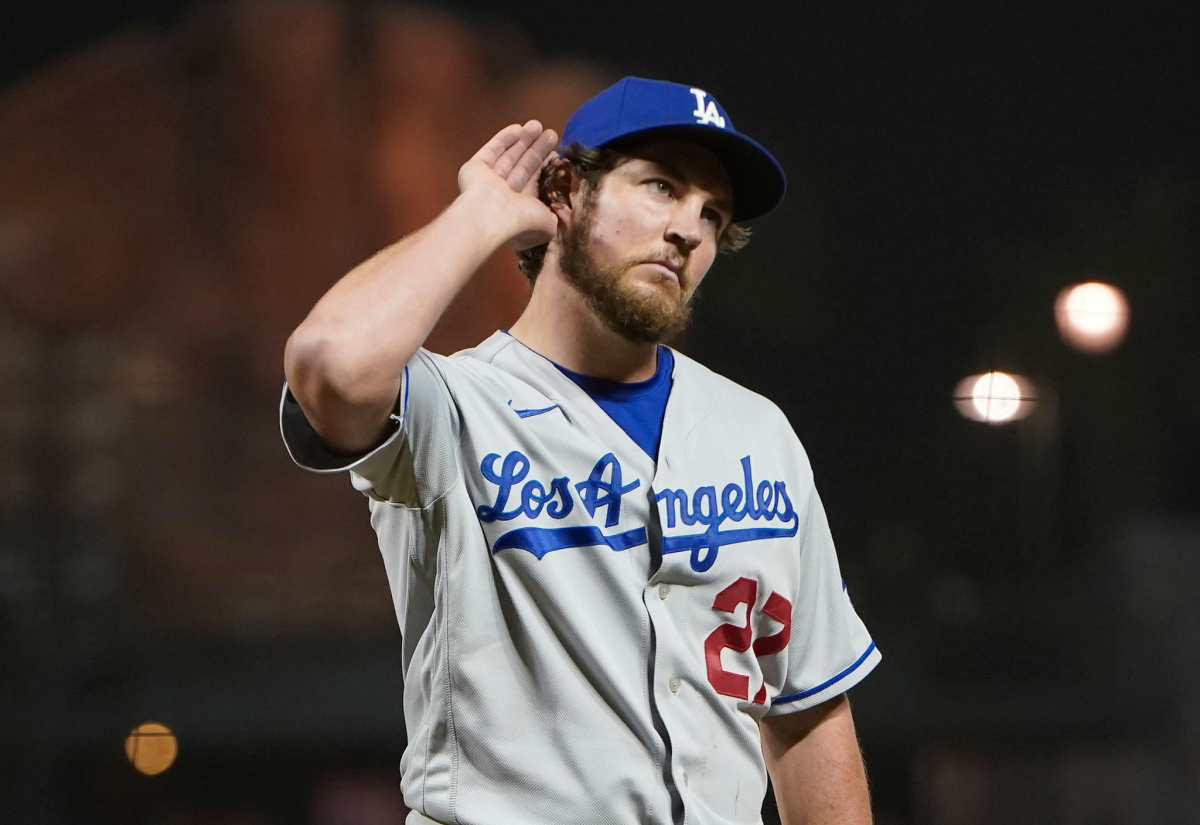
What I do know is that the Athletic wrote an article that started this whole thing, and one of the major comments was, ‘You fractured someone’s skull.’ The medical reports they had to write that article specifically said there was no skull fracture. They didn’t write that. And so I lost my ability to play baseball, in large part, because of the media attention around this. And it wasn’t covered fairly. It wasn’t covered accurately, in my opinion.
I didn’t expect to win any of these lawsuits. Defamation suits are extremely hard to win. But I had to make a decision, as a person, about what I was willing to accept and what I was willing to live with.
Your argument is that the media attention made it harder for you, but the lawsuits generated more media attention.
I don’t know that I played this perfectly. I’m sure that I made mistakes in strategy along the way. But I was having to weigh two separate things: what is best to get back into MLB, which no one knows, and what I am going to be able to live with for the rest of my life. Sometimes, those two things don’t match, and I have to make a decision between the two.
When you were on Fox News, and the gentleman who did the interview asked why baseball did what it did to you, you said, “I’m not exactly sure why they did what they did.”
But you have the league’s investigative report. Your lawyers discussed whether you had to turn it over in the Lindsey Hill case, and your lawyers needed it to prepare for the arbitration hearing. So you know. Why were you suspended?
Luba: I don’t understand the questioning.
The comment you gave to Fox was that you weren’t exactly sure why they did what they did, in terms of a suspension, and how severe it was. But you had to argue about it with an arbitrator to get it reduced, so everybody there knew what was in the Major League Baseball report that, to them, justified the suspension. So my question to you is: Why were you suspended?
They thought that I had violated their policy.
Why did they think you had violated their policy? You’ve denied doing anything that violated their policy.
I can’t speak to that. I’d love to go into it. But, if I go into it, I could be suspended again, and that would guarantee that I’d never play again.
Let me ask you this: I understand the report is confidential. I don’t have access to it, even as an owner. So what I have to go on, if I’m deciding whether to sign you, is this: You were accused of sexual assault by multiple women. You were never charged. But, still, an arbitrator upheld what even after its reduction was still the longest suspension ever given to anyone for violating the policy. And there is one civil case still pending.
As an owner, how do I add all that up and figure out whether I want to sign you?
That’s a tough one. My best answer to that is, yeah, I was suspended, and I was given the longest suspension in history. But what ended up happening from the arbitration is, I was cleared to play immediately.
I’ve been out of the league for more than twice what my suspension was. I have served more than double that time out of the league.
I don’t believe that I was given a lifetime ban. So, even if you say that I was suspended, I have served my time. Do I not deserve to have an opportunity to come back? I’m not sure. It’s hard to reconcile. I get it. It’s the hardest to reconcile for me. I know what happened. I was there. I’m the only person who knows exactly what happened — obviously, the women were there as well.
I didn’t sexually assault anyone. I didn’t violate the policy. That’s what was ruled. I can’t change that. I’ve served more than twice my time. I’ve never been arrested. I’ve never been charged with anything. Evidence has come out that makes it clear — at least to me — about what this has been about.
I would like to have a chance to play again, to resume my career. I’ve devoted 30 years of my life to developing this skill set. I’d like to have that opportunity again.
I saw where you offered to sign for the major league minimum. Did a team tell you it wouldn’t sign you because it thought it would have to pay you too much, or was there some other reason?
The reason for that was, I want to go back to work, and I am trying to find any way that I possibly can to limit the risk and exposure for a team. I realize there are a lot of other things, outside of the on-field stuff, that go into whether to sign me. So I figured that, if I could limit the on-field risk as much as possible, perhaps that offsets some of the other perceived risks.
Specifically with the Dodgers, for example: I was supposed to be there in the playoffs in 2021, to win the World Series. That is what I signed up to do. That is what they paid me to do. They were paying me, and I was not there, because of decisions I made to associate with people and positions I put myself in that I had no control over. I don’t feel good about that. I would like to play for the Dodgers, for the minimum. I’d like to pitch every fourth day, and make 44 starts, and at the end of it [they] say, ‘OK, it happened in a weird way, but we got the number of starts we paid you for.’ I would feel better about that personally.
This is not about, I want to be paid $30 million a year or whatever. I realize there are concerns. I would just like to go back to work. I just want the opportunity to go play. I’ve devoted my entire life to playing.
I didn’t do what I was accused of. I was falsely accused. I didn’t sexually assault anyone. I’ve made a lot of mistakes along the way too. I just want a chance to go back to work.
Since you mentioned mistakes and second chances: When you signed with the Dodgers in 2021, you were asked during a press conference about your behavior on social media, and incidents you have had with various people. You said: “Everyone makes mistakes. … I try to learn from them as quickly as I possibly can.” Even on social media this winter, you were criticized for an incident where you supported a Navy officer whose negligent driving had killed two people in Japan. I understand you know him and I am sure you meant well but, when you’re asking for second chances, I might wonder: Haven’t you already gotten a second chance that way?
So I’m wondering, if I sign you, knowing how prominent you are on social media, how can I trust that there isn’t going to be some kind of controversy for my team down the road?
That one hurts, because I didn’t post that. People who run my account posted that. Now I made the choice to allow them to run my account, figuring that it would be more of a positive to have someone else run my account.
That doesn’t answer the question I asked.
That’s why it hurts. I made a choice to remove myself from social media so that there wouldn’t be controversy, and put it in the hands of people who would present the things that I do and that I like to present: making content that helps the game. For the past two or three years, that’s been basically the only thing I’ve put out on social media. I ended up in the position where the choice I made to try to solve the initial issue resulted in something that turned into a negative.
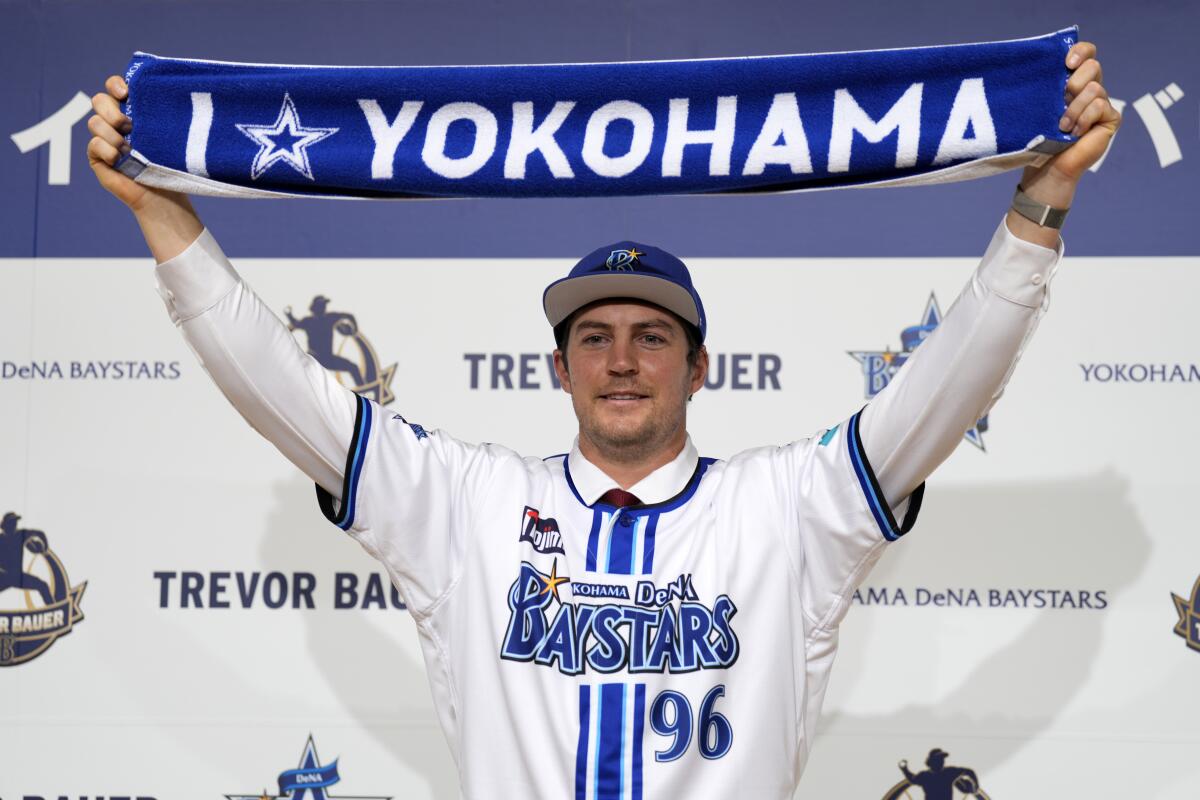
I want to work with a team on whatever is best for them and whatever concerns they have, so if someone came to me and said, ‘We don’t want you on social media at all. No posts,’ then we can certainly have that discussion. It’s something I like to do. For all the small moments along the way when there have been mistakes, I think there is a lot of good that comes from social media too — a lot of fan engagement, a lot of benefit.
I realize this conversation is more about the risks that go along with it, which is what an owner has to consider, but you also have to consider the benefits and weigh the two against each other. I think there are a lot of benefits to my social media presence.
You’ve done a lot of really creative things. You promote baseball. You share videos. You’ve got a line of merchandise. I’ve heard you say you would be interested in coaching college baseball at some point. Since you have all these options, and I think a lot of us in baseball would argue that playing in Major League Baseball is a privilege and not a right, I wonder why it is so important for you to play baseball with all these issues surrounding you?
I could walk away from baseball right now and be fine financially. I have other interests, and I have businesses. I’m a smart guy. I’ll be fine if I walk away from it. But my goal was always to be really good in my 30s, and so I’ve made a lot of choices along the way: in training, in life. I’ve lived in places in order to train. I’ve given things up for baseball. All with the goal of, when I get to between 30 and 40, I’m going to be really, really good at baseball. I’d like to win three Cy Youngs, and whatever goals I set for myself. I’m now in that window. I feel like I’ve accomplished the skill sets that I need. I want to have the opportunity to do that. It’s not about the money. It’s about an entire life’s worth of work going into accomplishing something.
Maybe the truth of the matter is that I’ve made an egregious enough mistake that I’m not going to get that privilege, I’m not going to have that opportunity. If that’s the case, that f— sucks. If associating with the wrong people and being accused of stuff that you didn’t do means that I can’t go back to playing Major League Baseball, if making a couple mistakes along the way on social media and in how I responded to people means I can’t go play Major League Baseball, that’s not for me to decide. It’s for the owners to decide. I hope that’s not the case. If that is the case, I have to live with that. I have to adjust my risk tolerance. I have to figure out how not to make those mistakes that take me out of the next thing I go try to do.
But I have spent my entire life trying to be good at baseball in my 30s. I’m better now than I ever have been at baseball, and I just want to have the opportunity to go prove that.
Is there anything else you would want me to know as an owner, or is there anything else I should be asking?
I guess the most frustrating thing in the whole process has been that it doesn’t seem like anyone looks at the positives. It doesn’t seem like anyone looks at all of the good things that I do along the way.
I’ve been to the playoffs every year since 2016 with every team that I have been on, with the exception of 2019, when I got traded in the middle of the year. I made every single pitching staff that I’ve been a part of better. I’ve made organizations as a whole better. I’ve engaged a lot of fans along the way. I’ve brought a lot of people to baseball. I’ve done a lot of good for organizations. I’ve sold a lot of merchandise. I’ve brought a lot of eyes to the game. And it seems like none of that matters.
I would just hope that, as an owner, you would look at the negatives, because that has to be looked at. I probably should have been better at looking at the negatives instead of just the positives. I’ve had a very high risk tolerance because I don’t consider the potential negatives. I just look at what’s optimal for the biggest benefit. That’s probably why I am in this situation, because I didn’t consider negative risk management. So I would hope that an owner fully looks at all the risks, but I would hope that they would take time to look at all the benefits as well. I am obviously biased, but I feel like the positives outweigh the negatives.
For zero incremental dollars over what you would have to pay that roster spot, there is not a single person in this entire world that would be better for that position than me, because of all the additional benefits that I bring — not even considering the fact that I am going to be really good.
More to Read
Are you a true-blue fan?
Get our Dodgers Dugout newsletter for insights, news and much more.
You may occasionally receive promotional content from the Los Angeles Times.

